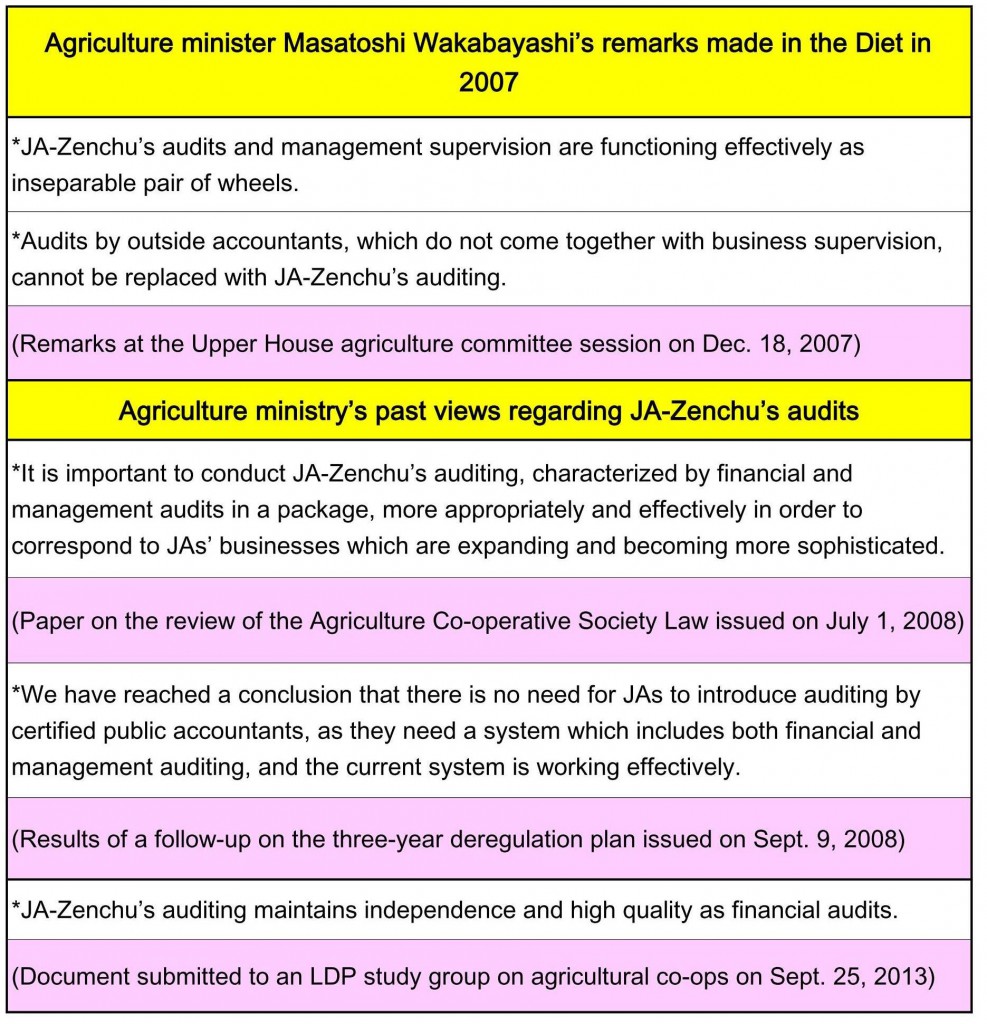The ruling Liberal Democratic Party and Komeito will begin intensive discussion this week to prepare a bill to revise the Agricultural Co-operative Society Law, focusing on auditing of primary agricultural co-ops.
Agriculture minister Koya Nishikawa is aiming at abolishing the current system of the Central Union of Agricultural Co-operatives (JA-Zenchu) conducting audits on primary JAs and introducing auditing by outside accountants. However, the idea contradicts with the ministry’s previous standpoint and Nishikawa has failed to explain reasonably how it will contribute to improving farmers’ income.
The LDP’s project team on the law revision headed by Lower House member Takamori Yoshikawa will hold meetings starting on Tuesday, Jan. 20, and Komeito’s committee on revitalizing the agriculture sector headed by Lower House member Noritoshi Ishida will set to work on Wednesday, Jan. 21. The government plans to put together early next month a framework for revising the law, in order to submit the bill to the ordinary Diet session which is scheduled to start Monday, Jan. 26.
The government believes the fact that primary JAs are required under the law to have audits by JA-Zenchu is taking away their freedom in management. Since the beginning of this year, Nishikawa has repeatedly stated that auditing by outside accountants is desirable.
Such an idea was proposed by the government’s Regulatory Reform Council, but the ministry had consistently been opposed to it. During the Upper House agriculture committee’s session held in December 2007, then agriculture minister Masatoshi Wakabayashi highly evaluated JA-Zenchu’s auditing, saying that the union’s audits and management supervision “are functioning effectively as inseparable pair of wheels.” He added that audits by outside accountants, which do not come together with business supervision, cannot be replaced with JA-Zenchu’s auditing.
Also in July 2008, the ministry released a document which stresses the importance of “conducting JA-Zenchu’s auditing, characterized by financial and management audits in a package, more appropriately and effectively” as JAs’ businesses are expanding and becoming more sophisticated. In September 2008, it issued an opinion denying the need for JAs to introduce auditing by certified public accountants, saying the co-operatives need a system which includes both financial and management auditing and the current system is working effectively.
Explaining the ministry’s policy shift, Nishikawa said that because 60 years have passed since JA-Zenchu’s auditing system was established, the ministry judged it would no longer be necessary for people inside the JA group to conduct audits on primary JAs, believing that audits by outside accountants would work better in watching over JAs’ management than having auditing done within the group.
However, in September 2013, in a paper submitted to the LDP’s study group on agricultural co-ops headed by Lower House member Hiroshi Moriyama, the ministry gave high marks to JA-Zenchu’s auditing as maintaining independence and high quality.
LDP’s senior politicians with close ties with the agricultural sector, who are against the introduction of audits by certified public accountants, criticize the ministry’s about-face.
The opposition parties are also questioning how the abolishment of JA-Zenchu’s auditing can lead to an increase in farmers’ income. In response to a question by Democratic Party of Japan’s Yuichiro Tamaki at the Lower House agriculture committee session on Tuesday, Jan. 13, Nishikawa said farmers’ income cannot be raised unless the scope of primary JAs’ freedom is expanded. Tamaki told Nishikawa that farmers would not understand his logic. The government has not even given any specific example of how JA-Zenchu’s auditing is taking away the freedom of primary JAs.
LDP members close to the agriculture sector say the government’s explanation is not at all convincing, adding that the bill would not be passed in the Diet if the government remains so off the mark. It is highly likely to become an issue of concern in the upcoming discussions within the ruling parties.
(Jan. 19, 2015)


